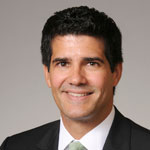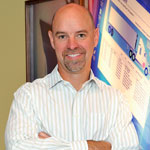Raised by her grandmother in the inner city and surrounded by poverty, Maritza Bond knew from an early age that helping people was her calling. The only problem was she didn’t know the capacity in which she could help. “I knew I didn’t want to be a nurse or a health-care provider, but I was interested in providing health awareness,” Bond says. It all fell into place when she took an “Introduction to Public Health” class during her freshman year of college. After a series of volunteering opportunities and internships, including one delivering meals to individuals affected by HIV/AIDS, she changed her major to public health.
After college, Bond joined Connecticut’s Naugatuck Valley Health District (NVHD), as a community health outreach worker, transitioning into the role of immunization action plan program coordinator before leaving the organization to become a project coordinator for Connecticut’s Southwest Area Health Education Center (SWAHEC) in 2006. One year later, she transitioned to Eastern Area Health Education Center (EAHEC), where she served as program coordinator. The federal Area Health Education Center (AHEC) Program was established 40 years ago, with the Connecticut AHEC Program launching in 1995. The organization’s mission is to improve health outcomes by creating partnerships in education and health care, providing support to health-care professionals, and strengthening the quality and supply of health-care providers.
83%
Underrepresented participants from ethnic and racial backgrounds in EAHEC’s program that prepares middle and high school students to participate in service learning experiences in health-care settings that serve marginalized populations.
Bond became executive director of EAHEC in the fall of 2012, but even during her first months on the job she played an integral role in the success of several of the organization’s landmark programs, including an immunization action program and an oral-health initiative. She was also a founding member of the Medical Interpreting Association of Connecticut, though Bond made her greatest impact with EAHEC’s medical interpreter program, launched in 2008. The program is still a point of enormous pride for Bond, as it promotes community interpreting and trains health-care interpreters who understand health care as a “cultural system.”
That is not to say that becoming director of EAHEC wasn’t a watershed moment for Bond, who was pursuing her master’s degree at the same time. “It was an interesting transition and I’d be lying if I said it wasn’t stressful,” Bond says. “In a lot of ways, it was like starting a new nonprofit from the ground up. It required that I constantly reassess my priorities and goals, which sometimes changed on a daily basis. So while it was a huge challenge, it was also a huge opportunity: it was a chance to demonstrate the skills I acquired. It was also an honor to be the first Latina executive director within the Connecticut AHEC network.”
The executive director is giving back to the community in many ways, big and small, while she meets EAHEC’s many goals. These include recruiting minority and nontraditional students into health-care careers, bringing educators and health-care professionals together, and increasing health-care access for underserved populations. Despite her success, Bond feels the need to keep pushing.
As far back as 2003, NVHD’s executive director told Bond they saw leadership potential in her and that she could be leading an organization one day. “I remember saying, ‘I don’t want to be the boss!’” Bond reflects. “Of course, I look back now knowing that it inspired me to pursue more. It’s amazing when people see things in you that you don’t even see in yourself and, as an employer, it’s important that I recognize and nurture the abilities of others. It’s a privilege to be able to do that for people. It’s not a responsibility I take lightly.”
$10,000
Funds from the Health Justice CT Challenge to implement A First Response to Rural Health Disparities program aimed at recruiting 10 high school students from Windham County to become certified EMTs or EMR.
Moving forward, Bond wants to continue to expose minorities to careers in the health-care field. Many of the people Bond hopes to reach are the first in their family to pursue higher education and they run the risk of dropping out. Securing funding is also a concern. EAHEC depends on state and federal resources and when grants are tied to state and federal monies, it may adversely affect the organization. As a result, Bond and her team are headed to Washington, DC, with national and local colleagues in hopes of increasing awareness of organizational services and securing more funding.
“I see it as an opportunity and a challenge,” Bond says. “It’s a difficult position to be in, but it’s important to me that we have more control over our funding. If you go into the health-care field in the nonprofit sector, there’s an understanding that there isn’t going to be a lot of money and that you’re not going to make a lot of money, but that’s not why any of this are in this. We’re here because we want to make a difference in our communities.”

